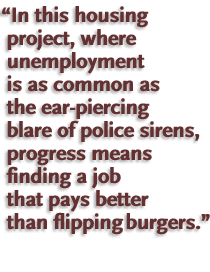 o the average cyberjock-- white, young and degreed-- the Net is about surfing for esoterica, proving your moxie, and maybe advancing a wide-open career. But residents of the Highland Additions public housing project in Washington, D.C., have more immediate concerns when it comes to the technology--hope for the future.
o the average cyberjock-- white, young and degreed-- the Net is about surfing for esoterica, proving your moxie, and maybe advancing a wide-open career. But residents of the Highland Additions public housing project in Washington, D.C., have more immediate concerns when it comes to the technology--hope for the future.
The Highland Additions project, located in one of D.C.'s toughest neighborhoods, was known as the worst of the worst. Floors were caving in. Trash was everywhere. Fed up, the Resident Council's protests forced officials to make improvements, but the innovation residents welcomed most was the wiring of the projects to the Net by the National Urban Internet, a public-private partnership.
Already, they say, life is changing for the better. "Living in low-income housing, people are sometimes made to feel low," says Anita Osborne, treasurer of the Resident Coucil. "Putting programs like this in place gives people more self-confidence to move forward."
In this housing project, where unemployment is as common as the ear-piercing blare of police sirens, progress means finding a job that pays better than flipping burgers. And many are banking on the Internet to guide them. Gloria Thurman recently went online looking for information on grants for public housing. "I want to find out how to improve my way of life," says Gloria, who browsed for material on how to earn a general equivalency diploma.
|



